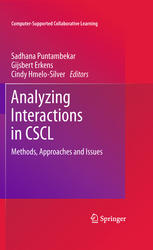

Most ebook files are in PDF format, so you can easily read them using various software such as Foxit Reader or directly on the Google Chrome browser.
Some ebook files are released by publishers in other formats such as .awz, .mobi, .epub, .fb2, etc. You may need to install specific software to read these formats on mobile/PC, such as Calibre.
Please read the tutorial at this link: https://ebookbell.com/faq
We offer FREE conversion to the popular formats you request; however, this may take some time. Therefore, right after payment, please email us, and we will try to provide the service as quickly as possible.
For some exceptional file formats or broken links (if any), please refrain from opening any disputes. Instead, email us first, and we will try to assist within a maximum of 6 hours.
EbookBell Team

4.7
26 reviewsAnalyzing Collaborative Interactions in CSCL Methods, Approaches, and Issues Sadhana Puntambekar, Gijsbert Erkens, and Cindy Hmelo-Silver, editors In more than two decades of research in CSCL (Computer-Supported Collaborative Learning), researchers have used several methods to understand how individuals learn in groups and how groups of learners construct knowledge. The individual and group learning processes have been studied using a variety of methods. Analyzing Collaborative Interactions in CSCL reveals the wide range of this research: qualitative and quantitative methods, studies of the learning process as well as outcomes, and the measurement of group and individual members’ learning. Focusing on three major research areas—group processes, learning within groups, and frameworks for analyzing CSCL—leading scholars present models, methods, and tools that readers can adapt to fit their own projects. Basic research issues such as defining the unit of analysis, determining the grain size of the data, and representing the temporality of interactions are discussed in the context of these methods addressing issues such as: • Studying group cognition through the lens of social order. • Using visualization methods to assess group members’ individual progress. • Analyzing collaborative interactions with data mining methods. • Assessing student project groups online and offline. • Using multilevel analysis in text-based communication. • Analyzing collaborative interactions across settings and domains. Together, the chapters in Analyzing Collaborative Interactions in CSCL model a range of methods for CSCL researchers in education, education technology, and cognitive science.